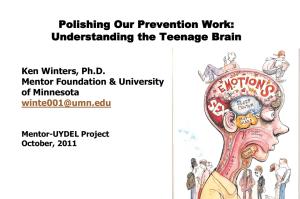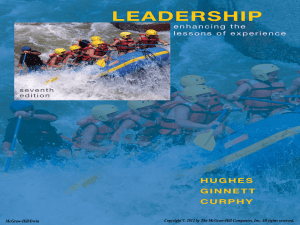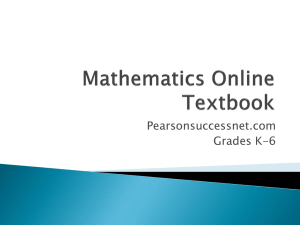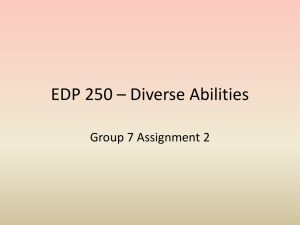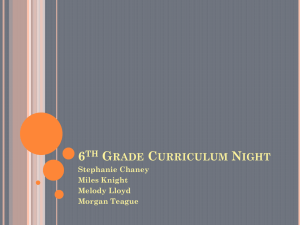characteristics of development stages for grades k-4
advertisement
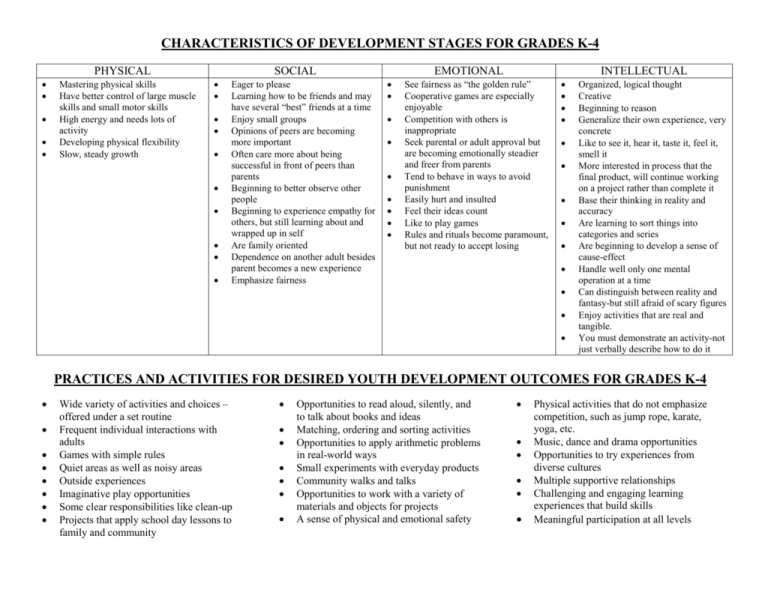
CHARACTERISTICS OF DEVELOPMENT STAGES FOR GRADES K-4 PHYSICAL Mastering physical skills Have better control of large muscle skills and small motor skills High energy and needs lots of activity Developing physical flexibility Slow, steady growth SOCIAL Eager to please Learning how to be friends and may have several “best” friends at a time Enjoy small groups Opinions of peers are becoming more important Often care more about being successful in front of peers than parents Beginning to better observe other people Beginning to experience empathy for others, but still learning about and wrapped up in self Are family oriented Dependence on another adult besides parent becomes a new experience Emphasize fairness EMOTIONAL INTELLECTUAL See fairness as “the golden rule” Cooperative games are especially enjoyable Competition with others is inappropriate Seek parental or adult approval but are becoming emotionally steadier and freer from parents Tend to behave in ways to avoid punishment Easily hurt and insulted Feel their ideas count Like to play games Rules and rituals become paramount, but not ready to accept losing Organized, logical thought Creative Beginning to reason Generalize their own experience, very concrete Like to see it, hear it, taste it, feel it, smell it More interested in process that the final product, will continue working on a project rather than complete it Base their thinking in reality and accuracy Are learning to sort things into categories and series Are beginning to develop a sense of cause-effect Handle well only one mental operation at a time Can distinguish between reality and fantasy-but still afraid of scary figures Enjoy activities that are real and tangible. You must demonstrate an activity-not just verbally describe how to do it PRACTICES AND ACTIVITIES FOR DESIRED YOUTH DEVELOPMENT OUTCOMES FOR GRADES K-4 Wide variety of activities and choices – offered under a set routine Frequent individual interactions with adults Games with simple rules Quiet areas as well as noisy areas Outside experiences Imaginative play opportunities Some clear responsibilities like clean-up Projects that apply school day lessons to family and community Opportunities to read aloud, silently, and to talk about books and ideas Matching, ordering and sorting activities Opportunities to apply arithmetic problems in real-world ways Small experiments with everyday products Community walks and talks Opportunities to work with a variety of materials and objects for projects A sense of physical and emotional safety Physical activities that do not emphasize competition, such as jump rope, karate, yoga, etc. Music, dance and drama opportunities Opportunities to try experiences from diverse cultures Multiple supportive relationships Challenging and engaging learning experiences that build skills Meaningful participation at all levels CHARACTERISTICS OF DEVELOPMENT STAGES FOR GRADES 4-8 PHYSICAL Experience steady increases in large muscle development, strength, balance and coordination Growth is slow for most Are quite active with boundless energy Activities should encourage physical involvement Are maturing at differing rates between sexes Are increasing in manual dexterity, small muscle coordination Growth spurts may occur at varying times, especially between boys and girls SOCIAL Generally see adults as authority and follow rules out of respect Believe punishment should be a direct consequence of misbehavior Want to know how they have improved and what they should do to be better next time Don’t like comparisons with others Feel loyal to group, club and gang Enjoy code language and passwords Identify with same-sex group May prefer to be with members of the same sex Prefer working in groups in cooperative activities Expand and use reasoning skills to solve problems, negotiate and compromise with peers Individual evaluation by an adult is preferable to group competition where only one can be the best EMOTIONAL INTELLECTUAL View right behavior as “obeying rules set by those in authority” Accept parent/family beliefs Admire and imitate older boys and girls Success should be emphasized Failures should be minimized Are developing decision-making and leadership skills Are making some movement toward taking responsibility for own actions Emphasize the similarities between self and friends Are beginning to question parental authority Look to adults for guidance and approval Find comparisons with success of others difficult and eroding of selfconfidence Still don’t handle competition well Strong need to feel accepted and worthwhile Vary greatly in academic abilities, interests and reasoning skills Concrete thinkers-like to see, feel, smell, hear or taste Have increased attention spans Have many interests which change rapidly Are beginning to think logically and symbolically Still prefer concrete ideas Are learning to use good judgment Judge ideas in absolutes = right/wrong; great/gross; fun/boring Want to use their skills to explore and investigate the world Have interest in collections and hobbies May express feeling through creative writing Like to share thoughts and reactions PRACTICES AND ACTIVITIES FOR DESIRED YOUTH DEVELOPMENT OUTCOMES FOR GRADES 4-8 Wide variety of options Connections to real-world experiences Opportunities to interact in large and small groups as well as individual recognition Experiences that explore ethics and values with respected adults Opportunities to serve others Physical activity Opportunities for decision-making Opportunities for leadership Opportunities to apply school day lessons through performances and projects Experiences emphasizing reasoning and problem-solving in art, mathematics and science Quiet times for homework with adult help and peer help when needed Opportunity to work with peers Games that provide opportunities to practice basic skills, such as chess, checkers, puzzles, word games Wide range of reading activities with discussions of the ideas found in the books Teach and use cooperative team processes Experiences built on a wide diversity of cultures and ethnic groups Multiple supportive relationships Challenging and engaging learning experiences that build skills Meaningful participation at all levels Build self esteem and social development Provide concrete feedback Opportunity to impact community Sense of belonging to community Opportunities for independence CHARACTERISTICS OF DEVELOPMENT STAGES FOR GRADES 8-12 PHYSICAL Highly developed motor skills Rapid changes in physical appearance may occur Changes in hormones contribute to mood swings Developing a new and unfamiliar body Fast and sudden growth spurts A period of ever-changing size and shape Need to perfect physical abilities and athletic talents Preoccupation with body image SOCIAL Oriented to the resent rather than the future Preoccupied with self presentation, physical maturity and acceptance by peer group Oriented to peer group More concerned with and motivated by social effects Seek opportunities for more independent judgment Differentiates between self and environment Feels unsure and awkward in social skills Experimentation (drugs, language, sex) Financial dependency Distancing from family and making own decisions Oriented to peers and role models Recognize diversity EMOTIONAL INTELLECTUAL Worry about ever-changing body and awkwardness Worry about clumsiness, illness and diet Task of learning to interact with members of the opposite sex may preoccupy and distract Less influenced by parents More influenced by peers Need and demand more privacy Need praise and adult recognition Admire “heroes” that demonstrate characteristics of friendship and romance Highly developed sense of identity Learning to cooperate with others on an adult level Time is precious Unsettled emotions may cause for drastic mood swings May be or appear to be withdrawn Increased ability to be responsible in the eyes of themselves, peers and adults Thought becomes more abstract, incorporating the principles of formal logic Ability to think abstractly Ability to generate abstract propositions, multiple hypotheses and their possible outcomes Thinking becomes less tied to concrete reality Formal logical systems can be acquired Can handle proportions, algebraic problems etc Ability to think hypothetically Integrates multiple factors in thinking about health, fitness and well-being Capable of synthesizing a wide range of relational material Learn by doing PRACTICES AND ACTIVITIES FOR DESIRED YOUTH DEVELOPMENT OUTCOMES FOR GRADES 8-12 Presentations and projects that involve appearance Opportunities to discuss and address physical risk, including smoking, drugs, drinking, and sexual activity Opportunities to tutor younger children Opportunities to show competence in a public setting Individual projects as well as teamwork in small and large group settings Substantial choices with clear limits Opportunities to express feelings through projects and activities Ono-on-one opportunities to talk with adults Loud and quiet areas for activities Discussions of diverse ideas and opinions with adults and peers Specific help with skill areas that are causing problems Opportunities to catch up or move ahead with academic interests Opportunities to work on school day projects and papers with library and Internet support Problem-solving and reasoning skills practice Opportunities to hone decision-making skills Opportunities to impact community Expanded involvement in community Opportunities toward economic selfsufficiency THE CHARACTERISTICS OF DEVELOPMENT STAGES K-4, 4-8, 8-12 AND THE PRACTICES AND ACTIVITIES FOR THE DESIRED YOUTH DEVELOPMENT OUTCOMES COMPILED BY THOM FOGARTY FOR EHTP 12/05 These charts discuss the common physical, social, emotional, and intellectual (cognitive) characteristics for each age group of K-4, 4-8, and 8-12 grades. Keep in mind that no two children develop at the same rate or exhibit corresponding characteristics. In addition, for some the transitions will be gradual, for others they will be abrupt, and these too will change depending on the development task at hand. A child may be very responsible and mature one day and noisy and bored the next. By being vigilant and aware of the current development stage and offering challenging and appropriate opportunities to help them make the transition into the next stage, we can help make EHTP a rewarding and fulfilling experience for the children at the same time we are helping them grow and develop. Children are influenced by the people and the places where they spend their time: their family, their friends, their school, and their community. It is important to remember that even though we look at specific aspects of the child’s development to understand them better, each child is a “whole child”, regardless of cultural background, economic status or ethnicity. They are “complete packages” unto themselves and should be allowed to revel in their own diversity. EHTP must strive to provide safe, reliable and accessible activities and spaces. Young people need: Sense of personal safety Structure Sense of belonging/membership Sense of self worth that is predicated on achievement and character Mastery of skills Access to learning opportunities beyond the classroom Responsibility Spirituality Self awareness Support and guidance from caring adults EHTP must provide the following four steps for Youth Development to occur in a positive way: Sense of competence Sense of usefulness Sense of belonging Sense of power EHTP is working to ensure that the following outcomes are part of the Youth Development experience: Academic competence Social/interpersonal competence Creative competency Vocational competency Health and fitness Age appropriate activities Involvement in activities that benefit others while providing them skills and experience YOUTH DEVELOPMENT PRACTICES 1. SAFETY Emotional Physical 2. RELATIONSHIP BUILDING Guidance Emotional support Practical support Knowledge of youth 3. YOUTH PARTICIPATION Input and decision making Leadership opportunities Sense of belonging 4. COMMUNITY INVOVLVEMENT Ability to impact community Knowledge of community 5. SKILL BUILDING Challenging Interesting Growth and progress PRACTICE = is the underlying rationale or process for an activity, or the WHY. ACTIVITY = is the way a practice is carried out, or the HOW. OUTCOME = is the result of positive youth development, or the WHAT.
